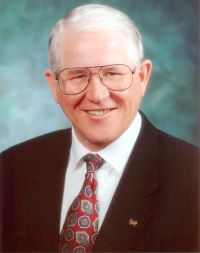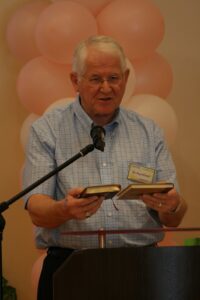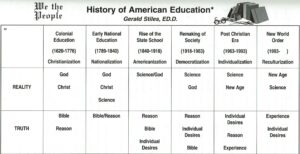 Last week I shared with you some of the lessons that God has taught me since I began teaching middle school history classes for the remainder of the year. History is very important to God and our relationship with Him. I shared two important lessons I learned in last week’s blog. They were:
Last week I shared with you some of the lessons that God has taught me since I began teaching middle school history classes for the remainder of the year. History is very important to God and our relationship with Him. I shared two important lessons I learned in last week’s blog. They were:
God is always working in history to fulfill one major purpose. God wants the whole world to know that He is God!
History is a record of God’s works!
There was a third lesson that I learned in this past week’s history classes.
History reminds us of God’s standards!
As image bearers of God, we are to represent Him in all we do. However, we live in a world where His standards are no longer known, much less obeyed. When people forget God’s standards, moral decline is always the result. Paul told the Corinthian Christians that the history lessons found in the Old Testament are there as examples for how we should live our lives.
Moreover, brethren, I do not want you to be unaware that all our fathers were under the cloud, all passed through the sea, all were baptized into Moses in the cloud and in the sea, all ate the same spiritual food, and all drank the same spiritual drink. For they drank of that spiritual Rock that followed them, and that Rock was Christ. But with most of them God was not well pleased, for their bodies were scattered in the wilderness. Now these things became our examples, to the intent that we should not lust after evil things as they also lusted. (1 Corinthians 10:1-6)
In this passage, Paul taught a history lesson to the church in Corinth. In teaching this lesson, Paul reminded the people that the Israelites forgot one of God’s very important standards — obedience. They had disobeyed God by not going in to take possession of the Promised Land. The result of forgetting God’s standard was that a whole generation had to die in the wilderness; their bodies were scattered in the wilderness.
As we study history, we should try to see if people suffered because they failed to uphold some of God’s standards. When we do this, we can avoid some serious consequences by not living our lives in line with His standards.
A final lesson I learned about history is this.
History is a record of God’s judgment!
All history is a study of the past and how God dealt with people in relation to how the people worshiped and obeyed Him. This truth is clearly evident throughout God’s Word. Consider the following passage of Scripture.
So I scattered them among the nations, and they were dispersed throughout the countries; I judged them according to their ways and their deeds. When they came to the nations, wherever they went, they profaned My holy name—when they said of them, ‘These are the people of the Lord, and yet they have gone out of His land.’ But I had concern for My holy name, which the house of Israel had profaned among the nations wherever they went. “Therefore say to the house of Israel, ‘Thus says the Lord God: “I do not do this for your sake, O house of Israel, but for My holy name’s sake, which you have profaned among the nations wherever you went. And I will sanctify My great name, which has been profaned among the nations, which you have profaned in their midst; and the nations shall know that I am the Lord,” says the Lord God, “when I am hallowed in you before their eyes. Ezekiel 36:19-23
The prophet, Ezekiel, writes that God will judge people according to their ways and deeds. If people profane His holy name by acting contrary to His precepts, God will always bring judgement on those people. He does so for the sake of His holy name. God will never allow His name, which represents His character, to be defiled. When God brings judgement, He does so in order to sanctify My great name.
As I shared these four reasons why history is important to God, some of the students responded that they knew that God worked in history during the times of the Old and New Testament. However, did He continue to work in the same way after the Bible was written and is He still doing this today?
This is when I referred back to the Six Essential Truths of a Biblical Worldview that we had covered earlier. The first truth is that God is eternal in both His person and His nature. I reminded the students that since God and His character are eternal, He cannot change. If He worked in certain ways to make Himself known in the history found in the Bible, He must be doing the same today. If not, He has changed and, therefore, He cannot be eternal.
History becomes very important when it is studied in light of these four lessons. This is the only way to fully understand history and, therefore, accurately interpret current conditions in the world and/or one’s country. What is even more fascinating is that God works for the same purpose and in the same ways in our personal histories.
What would happen if our students not only viewed the history of the world from this perspective but also their own history and where they are today? I believe it would transform lives like we haven’t seen in quite some time. I pray that you and I will never see history as simply a body of facts about people, places and events. History is a record of God’s amazing plan for mankind!

 As I shared in last week’s post, I am teaching 6-9th grade history at our local Christian school for the remainder of the year. It has been exciting to be back in the classroom and sharing truth with the students. If you haven’t read last week’s article, I encourage you to do so. You can access it
As I shared in last week’s post, I am teaching 6-9th grade history at our local Christian school for the remainder of the year. It has been exciting to be back in the classroom and sharing truth with the students. If you haven’t read last week’s article, I encourage you to do so. You can access it  Several years ago I was at an event and heard Josh McDowell describe what has happened in our culture over the years. He said that in the early days of our country there was a Judeo-Christian culture. This was marked by the culture actually supporting the beliefs and values of Christianity. Unfortunately, we drifted into a post-Christian culture. McDowell explained that this type of culture was one that merely tolerated Christianity. Then, he said we are now living in an anti-Christian culture. An anti-Christian culture is marked by society attacking every belief and value of the Christian faith.
Several years ago I was at an event and heard Josh McDowell describe what has happened in our culture over the years. He said that in the early days of our country there was a Judeo-Christian culture. This was marked by the culture actually supporting the beliefs and values of Christianity. Unfortunately, we drifted into a post-Christian culture. McDowell explained that this type of culture was one that merely tolerated Christianity. Then, he said we are now living in an anti-Christian culture. An anti-Christian culture is marked by society attacking every belief and value of the Christian faith. Last week I shared my concerns about the consequences we are experiencing because we have become a people who has forgotten God. Since posting the blog, I have been asking myself several questions about what the future might hold if we continue in the downward spiral that will lead us further into moral bankruptcy.
Last week I shared my concerns about the consequences we are experiencing because we have become a people who has forgotten God. Since posting the blog, I have been asking myself several questions about what the future might hold if we continue in the downward spiral that will lead us further into moral bankruptcy. It was the summer of 1978. I was a young administrator at Lynchburg Christian Academy and had the opportunity to attend the International Institute of Christian School Educators in Winona Lake, IN. It was at this week-long event that I was first introduced to Dr. Paul Kienel.
It was the summer of 1978. I was a young administrator at Lynchburg Christian Academy and had the opportunity to attend the International Institute of Christian School Educators in Winona Lake, IN. It was at this week-long event that I was first introduced to Dr. Paul Kienel.

 Since Paul believed so much in the family, it was no coincidence that he treated the ACSI staff as one big family. In many ways, Dr. Kienel was like a father to me and others who served with him.
Since Paul believed so much in the family, it was no coincidence that he treated the ACSI staff as one big family. In many ways, Dr. Kienel was like a father to me and others who served with him. In fact, he built many of the cabinets and the conference table in ACSI’s headquarters when it moved to Colorado Springs. At a recent gathering of former staff members in Branson, MO, Dr. Kienel presented each of us that were there with a beautiful gift. He had handmade a wood pen holder that is still on my desk today.
In fact, he built many of the cabinets and the conference table in ACSI’s headquarters when it moved to Colorado Springs. At a recent gathering of former staff members in Branson, MO, Dr. Kienel presented each of us that were there with a beautiful gift. He had handmade a wood pen holder that is still on my desk today. I knew that Dr. Kienel was always praying for me as was the case with everyone that he influenced. I could follow his advice and direction because I knew that he always taught me the “good and the right way”. He will be missed for certain. Only eternity will show how many thousands of lives were impacted for Christ because of his service to his Lord and Savior. There is no doubt in my mind that he heard the words that all of us should strive to hear when we enter God’s presence.
I knew that Dr. Kienel was always praying for me as was the case with everyone that he influenced. I could follow his advice and direction because I knew that he always taught me the “good and the right way”. He will be missed for certain. Only eternity will show how many thousands of lives were impacted for Christ because of his service to his Lord and Savior. There is no doubt in my mind that he heard the words that all of us should strive to hear when we enter God’s presence. In the mid-1900s there was a battle taking place among Christians concerning the Bible. I remember reading Harold Lindsell’s book, The Battle for the Bible, in 1978. Lindsell’s book addressed the issue that was at the heart of the battle at the time – the inerrancy of Scripture. Bible scholar, J. Otis Yoder, summed up the importance of inerrancy this way.
In the mid-1900s there was a battle taking place among Christians concerning the Bible. I remember reading Harold Lindsell’s book, The Battle for the Bible, in 1978. Lindsell’s book addressed the issue that was at the heart of the battle at the time – the inerrancy of Scripture. Bible scholar, J. Otis Yoder, summed up the importance of inerrancy this way. In the early days of American education, ultimate truth was found in the Bible. Any human reasoning that was taught was always in subjection to God’s Word. Then, a subtle shift started taking place. The Bible and human reason became equally important in determining truth. Later, human reasoning became the primary source of finding truth and the Bible was seen as a secondary source. Today, truth is determined by the individual and his/her experience. If it isn’t experienced by the individual, then it isn’t true!
In the early days of American education, ultimate truth was found in the Bible. Any human reasoning that was taught was always in subjection to God’s Word. Then, a subtle shift started taking place. The Bible and human reason became equally important in determining truth. Later, human reasoning became the primary source of finding truth and the Bible was seen as a secondary source. Today, truth is determined by the individual and his/her experience. If it isn’t experienced by the individual, then it isn’t true! This is why I am thrilled to announce an upcoming event for Christians who want to see God raise up a new generation of Christ-followers who will turn their world upside down for Him. July 7-9, 2021 are the dates for the first Kingdom Education Summit. This event will be hosted by Word of God Ministries in Shreveport, LA.
This is why I am thrilled to announce an upcoming event for Christians who want to see God raise up a new generation of Christ-followers who will turn their world upside down for Him. July 7-9, 2021 are the dates for the first Kingdom Education Summit. This event will be hosted by Word of God Ministries in Shreveport, LA. I have been sharing a fresh mission statement that God laid on my heart several weeks ago. This mission statement provides Kingdom Education Ministries with a focus for what God wants to accomplish through KEM in the future. The focus of KEM is to:
I have been sharing a fresh mission statement that God laid on my heart several weeks ago. This mission statement provides Kingdom Education Ministries with a focus for what God wants to accomplish through KEM in the future. The focus of KEM is to: Over the past few weeks I have been sharing with you the fresh vision God has given me for Kingdom Education Ministries. With each passing day I become more convinced that God is calling KEM to:
Over the past few weeks I have been sharing with you the fresh vision God has given me for Kingdom Education Ministries. With each passing day I become more convinced that God is calling KEM to: July was a challenging time for me as I took some time off from writing my weekly blog. It was a month when I spent a great deal of time alone with the Lord and in His Word. During my quiet time, I began a study of the Old Testament prophets. Every day I poured over the books of the prophets from Isaiah to Malachi. It is challenging to read about what these men of God were called to do and the persecution that they encountered by being obedient to God’s call on their lives.
July was a challenging time for me as I took some time off from writing my weekly blog. It was a month when I spent a great deal of time alone with the Lord and in His Word. During my quiet time, I began a study of the Old Testament prophets. Every day I poured over the books of the prophets from Isaiah to Malachi. It is challenging to read about what these men of God were called to do and the persecution that they encountered by being obedient to God’s call on their lives.
Recent Comments